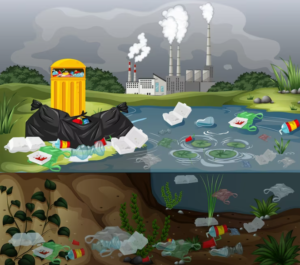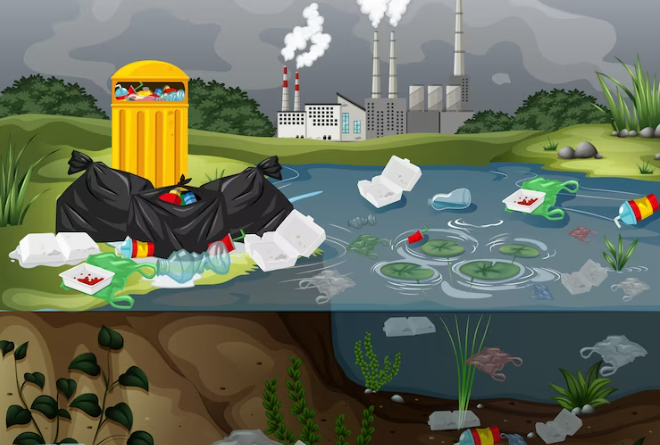Effects of Water Pollution on the Environment
Effects of Water Pollution on the Environment
Water pollution, created from different anthropogenetic exercises, smears expansive and difficult impacts on the climate. These effects have global, environmental, biological, financial, and human health insinuations, and stress the need for complete extenuation efforts. Here is an inside-and-out investigation of these results:

Impact on Aquatic Life:
- Fish and Wildlife Deterioration: Poisoned water presents an excess of pollutants and pollutants that accrue in the matter of aquatic creatures. This growth results in abridged generative success, changed behavior, and augmented humanity among fish and other environments.
- Biodiversity Loss: The effects extend to biodiversity loss, as the pollution of water ecosystems disturbs the slight balance of various species, leading to potential extinctions and ecological inequalities.
Disruption of Ecosystems:
- Food Chain Disruption: Through bioaccumulation, pollutants cross the food chain, absorbed by hunters at the top. This pressure pressures not only the health of these killers but also humans who consume dirty seafood, showing the interrelation of ecologies.
- Habitat Destruction: Polluted water contributes to the deprivation and obliteration of aquatic homes, moving the vegetation and wildlife that depend on these environments for nutrition and housing.
Human Health Impacts:
- Waterborne Diseases: Dirty water serves as an upbringing ground for infective bacteria, important to the spread of waterborne diseases. Cholera, dysentery, and typhoid are among the health risks related to contact with polluted water.
- Contaminated Drinking Water: People trusting polluted water sources for drinking water face sharp risks of contact with damaging chemicals and pathogens, resulting in a range of health issues.
Economic Consequences:
- Impact on Fisheries: The decline in fish people due to water pollution has economic results, affecting piscaries and the livelihoods of those dependent on them. This, in turn, impacts food security and the economic constancy of groups trusting casting.
- Costs of Cleanup: The redress of polluted water sources is an expensive attempt, placing financial loads on governments, groups, and productions. These costs contain not only cleanup efforts but also the restoration of ecosystems affected by pollution.
Aesthetic and Recreational Impact:
- Visual Pollution: Dirty water forms often exhibit visible signs such as variable wreckage, oil slicks, and stained water. Outside the eco-friendly harm, this graphic pollution affects the aesthetics of natural scenes.
- Recreational Hazards: Dirty water poses risks to persons attracted to fun doings like spinning, boating, and fishing. This not only conciliations the safety of these doings but also reduces the entertaining value of water forms.
Global Implications:
Climate Change Contributions: Certain impurities from water bodies donate to climate change. Methane and nitrous oxide release, for instance, impairs the greenhouse effect, causal to global warming and the importance of the consistent nature of ecological tasks.
Tending to water contamination requires a multi-layered approach, including contamination counteraction, severe administrative measures, and the reception of reasonable practices. For the liquor of ecosystems, human inhabitants, and the whole planet, maintainable water running and upkeep efforts are unconditionally necessary.
FAQS :
Q. How really does water contamination influence amphibian life?
Ans. Water contamination disturbs amphibian biological systems, prompting the downfall of fish, plants, and different living beings.
Q. What are the financial consequences of water contamination?
Ans. The global economy is impacted by rising water purification costs and losses for industries that rely on clean water.
Q. How could people add to battling water contamination?
Ans. Taking on maintainable works, supporting drives, and bringing issues to light assume a critical part in protecting water quality.
Q. For what reason is worldwide cooperation fundamental in tending to water contamination?
Ans. Pollution of water has no boundaries; In order to effectively address this issue on a large scale, global collaboration is essential.
Q. What are the future outcomes assuming water contamination proceeds unabated?
Ans. Proceeded with water contamination compromises irreversible harm to biological systems, biodiversity, and human well-being, accentuating the requirement for sure-fire activity.




